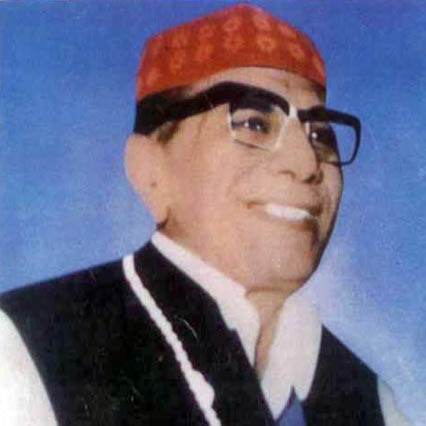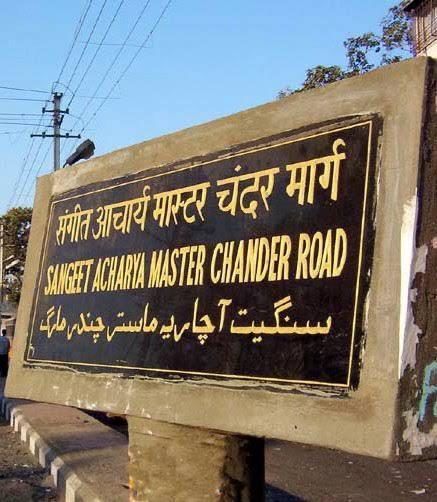
After the partition, Master Chander, accompanied by one of his sons, visited motherland Sindh and also traveled in train to his hometown Tharushah in September 1955.
Master Chander, an acclaimed singer and music composer, who was born on December 7, 1907, and passed away on November 3, 1984, still lives in the hearts of millions of people of subcontinent and around the world, being a soulful singer who had the voice that stood out from the rest and held the audience in trance wherever he sang since early 20th century.
Master Chander was born to his Zamindar parents as Chandu Mal Damowani in Tharu Shah, a small town of Naushahro Feroze District (Formerly Nawabshah District), also known as Sahiti Pargana of Sindh province.
He got early education in Tharu Shah. In his family, singing was not encouraged but Master Chander had a passion for music and learned the notes of classical music. He used to write lyrics and compose them in classical and folk tunes. Though his parents restricted him, he continued his passion for music until he started singing in drawing rooms, orchards and parties.
 Master Chander also worked in public works department at Nawab Shah. During his job at Karachi he opened schools for music where he used to train music lovers for which he was known as Master Chander. Jeevat Ram Mitai, Khan Sahab Barrey Ghulam Ali Khan, Khan Sahab Ashiq and others were among his music teachers.
Master Chander also worked in public works department at Nawab Shah. During his job at Karachi he opened schools for music where he used to train music lovers for which he was known as Master Chander. Jeevat Ram Mitai, Khan Sahab Barrey Ghulam Ali Khan, Khan Sahab Ashiq and others were among his music teachers.
Watch Master Chander’s interview
He recorded his first song “Suhina arz aaahe” in 1932. There must be thousands of songs sung by master Chander but information is available only about 400. “Rutha e rahan par hujan hayati” (let them live long even when they are not on good terms) is one of his popular rendering.
One day Bhagat Kanwar Raam, a great Sufi singer himself, saw him while singing and predicted that Chander would become a great singer in the future and will shine like moon.
Chander introduced new trends in music. He was first to sing kalam and songs related to love in Sindhi language. His listeners and admirers forgot themselves on the tunes of his singing. He recorded many ghazals and geets for Sindhi and Urdu movies on gramophone.
Listen to Master Chander’s song
During the 1947 partition, Master Chander and the majority of Sindhi Hindus left their homes and properties in Sindh. He narrowly escaped his own death during those tumultuous days, having sent his family- his pregnant wife, mother, three sons and three daughters, as well as extended family members ahead in a ship to Bombay. Seeing the plight of his people and missing his homeland, he began writing and singing songs for developing confidence among the displaced Hindu Sindhis in India. One of the notable songs during this period was “Mitha Abana.”
 Master Chander also took part as an actor in India’s first Sindhi Film “Abana” in 1958. Besides he also performed in various Urdu films like “Dilaram” and “Mout ka toofan”, in which he played as hero. He was also selected for “Achoot Kanhaya” with Devika Rani but later was replaced by Ashok Kumar. Many of his fans used to spend huge amounts for watching his concert.
Master Chander also took part as an actor in India’s first Sindhi Film “Abana” in 1958. Besides he also performed in various Urdu films like “Dilaram” and “Mout ka toofan”, in which he played as hero. He was also selected for “Achoot Kanhaya” with Devika Rani but later was replaced by Ashok Kumar. Many of his fans used to spend huge amounts for watching his concert.
After partition of the subcontinent, he migrated from Sindh to India. He performed throughout the world. His songs are still broadcast by All India Radio Delhi.
Master Chander’s career spanned over half a century. His Master’s Voice Company awarded Chander several gold medals. In addition, the Sindhi Panchayats & Associations in India and abroad honored him with medals, trophies, and other tokens of respect and recognition. The last of these honors was presented in 1982 by ‘International Sindhi’ at Birla Matoshri Hall, Mumbai.
After the partition, Master Chander, accompanied by one of his sons, visited motherland Sindh and also traveled in train to his hometown Tharushah in September 1955 and to his surprise he was received by thousands of people, men and women, with great love and respect who showered on him rose petals. According to some people of old generation, his admirers traveled from different towns and villages to have a look of Master Chander and listen to his songs. Master Chander and his son were taken in a big procession from railway station to the school ground in the heart of town where he performed almost whole the night. It was his first and the last visit to Sindh after partition.
Very emotional scenes were seen during his singing when Master Chander as well as the audience couldn’t control their tears. And, the most emotional moments were witnessed when Master Chander went to see his own home, which then housed a migrant Khanzada family.
Watch interview of Haji Akhtar Khanzada
This family, who chose Tharushah to settle after migrating from India, felt proud and took it as a responsibility maintain the house in its original shape as the custodian of the house of legendary Singer. This family later remained in constant touch with Master Chander and his sons Gope Chander and Mahesh Chander and often shared photographs of the house.
_____________________
Source: People Pill and other websites